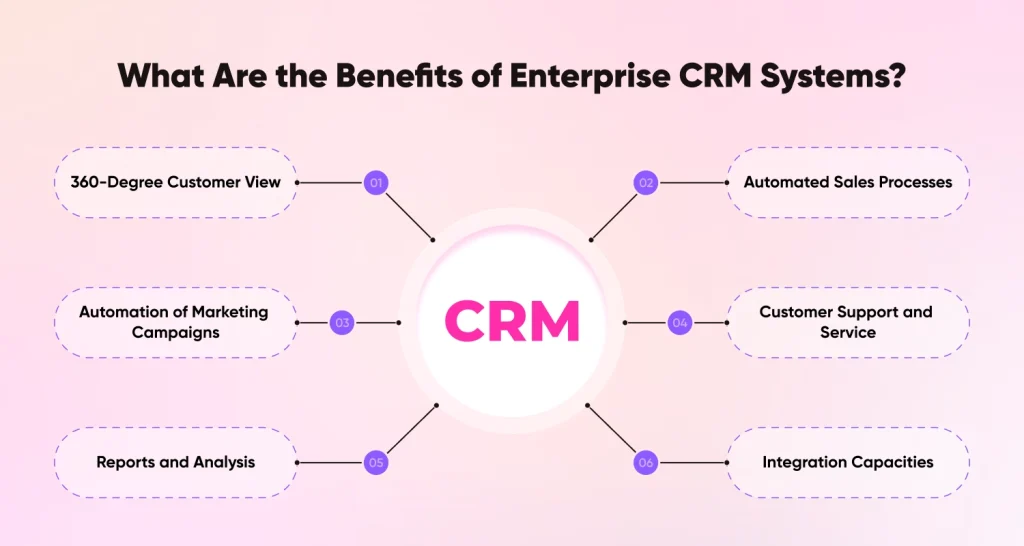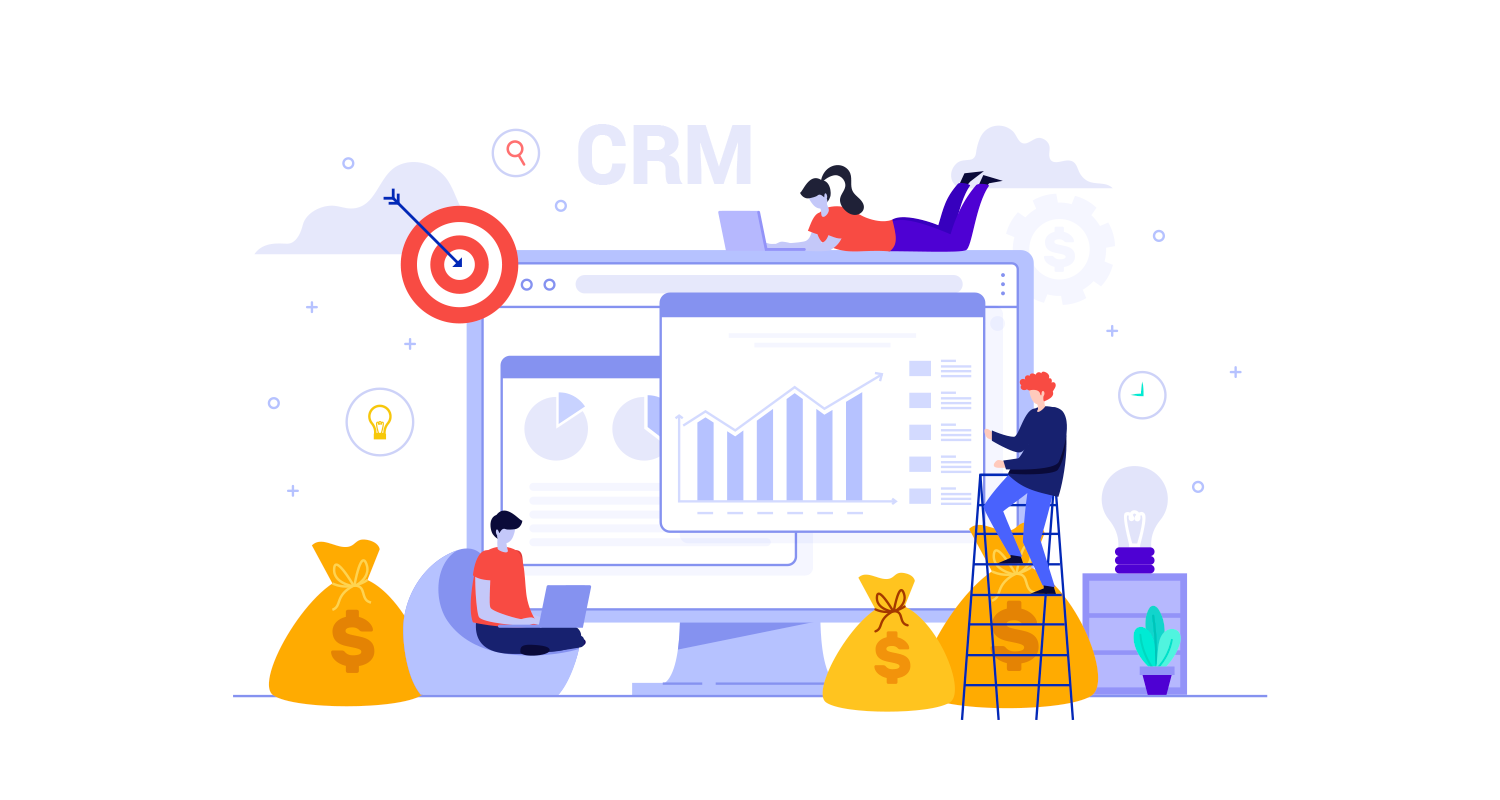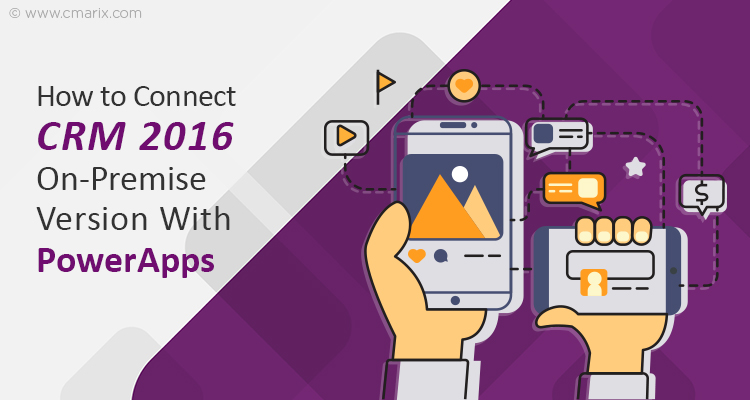In today’s era, as businesses keep expanding and more people are taking to digital platforms, data is at the core of everything. Businesses need user-generated data to reach more customers and stay afloat and people need data from businesses to make day-to-day decisions. But, how do businesses handle so much data and ensure better maintenance of customer relationships? Well, it seems like enterprise CRM solutions are the answer for several businesses. To help you determine whether it is right for you or not, we have curated this guide on the implementation of Enterprise CRM solutions.
Here, we will not only discuss what CRM solutions are about, but will also help you understand why it is necessary. Then, we will list some of the benefits of implementing enterprise CRM solutions and answer FAQs. So, what are you waiting for? Jump right into this article and get started on your journey to implementing enterprise CRM solutions for better business benefits.
What Does Implementation Of Enterprise CRM Solutions Refer To?
Enterprise Customer Relationship Management (CRM) software solutions help businesses collect essential information that helps them gain insight into customer preferences and behavior. CRMs also help businesses store data and aid organizations in better-managing relationships with customers, partners, and stakeholders. Ultimately, this allows businesses to streamline their operations which helps boost customer conversion rates and bring in more sales. When you implement a CRM system that suits your business needs, managing customer journeys, maintaining business leads, and tracking lead pipelines becomes much easier.
When we mention the term – implementation of enterprise CRM solutions, we refer to the process of setting up CRM software that allows you to accurately collect data and improve sales. Whichever CRM platform you choose, successful and effective CRM implementation is a must. Also, remember that a CRM does aid your business and can help bring in better results, but your team is at the core of all operations. So, you must ensure that you have adopted a well-planned implementation strategy that does not harm your team members but aids them.
Is Enterprise CRM Integration Worth It?
Before we jump into the benefits of enterprise CRM systems, it is necessary to take a step back and discuss whether it is really worth it.
Businesses that have been in the industry for a long time favor enterprise CRM integration. This is because successful integration of a CRM with the businesses’ other technologies helps add to the overall functionality of the organization’s software and boost the power of the CRM used. A key point to note here is that before buying CRM software, you must check whether it seamlessly integrates with your company’s existing technologies.
Some common software solutions that must integrate with your CRM solution include calendar, messaging, video, phone, and email software. It is a bonus if your CRM software seamlessly integrates with your marketing automation platform, social media management apps, account software, and lead tracking platform.
What Are The Benefits Of Enterprise CRM Systems?

Now that we know that enterprise CRM integration solutions can help, let us look at what benefits you can expect once you have successfully integrated your CRM solutions with your systems.
360-Degree Customer View
Businesses are exposed to huge amounts of customer data every day and consolidating these for better analysis and insights are essential. With CRM software solutions, businesses can better store and manage these huge amounts of data. This helps them get a better understanding of customer behavior, purchasing history, and preferences. Businesses can utilize this information to curate better marketing campaigns and ensure increased customer engagement.
Automated Sales Processes
CRM solutions are highly efficient in automating business processes to streamline sales. The software tracks leads, business opportunities, and customer deals and utilizes them to ensure better curation of personalized deals. With CRM software solutions, businesses can also better manage contracts, track the overall sales pipelines, and customer accounts to ensure better collaboration.
Automation Of Marketing Campaigns
With CRM enterprise software solutions, businesses have access to customer data and preferences. When combined with analytical tools, they can get better insights that can be implemented to create targeted and personalized marketing campaigns. This will aid your marketing team in the creation and delivery of targeted emails and allow tracking of marketing campaigns and advertising performances.
Customer Support And Service
CRM solutions are great tools that can be utilized to track customer queries and doubts and ensure 100% customer satisfaction. The customer support team can utilize the software to check the status of a query, assign it to a team member, and hold people accountable for any delays or errors.

Reports And Analysis
Most advanced enterprise CRM solutions come equipped with powerful analytics and reporting capabilities. This allows businesses to better track key performance indicators (KPIs), keep marketing campaigns in check, monitor the industry’s sales trends, and identify issues that can be solved for better customer deals.
Integration Capacities
Generally, enterprise CRM solutions can be integrated with other business software solutions that are in use. This allows better tracking and analysis of different business processes and helps teams identify issues (if any).
What Steps To Follow To Successfully Implement Enterprise CRM Solutions?
Now that we have identified the benefits of CRM solutions, it is necessary to define the steps to ensure the successful implementation of enterprise CRM solutions. We have listed the steps in detail in the section below to help you get started!
Select Teams Responsible For Your CRM Selection And Implementation
To ensure successful implementation of enterprise CRM solutions, you must create a team that includes key stakeholders. This team must be responsible for the selection of a CRM solution for your business. You must also create a team responsible for the implementation of your enterprise CRM solution. We recommend creating a diverse team that is skilled in different facets and can take on any CRM issues you might face in the future.
Identify CRM Goals, Needs, And Budget
Before you embark on your journey to check out the different CRM solutions available, you must answer these questions – what are the top business goals that your CRM must fulfill? How much money can you spend on your CRM solution without compromising on other business processes? What functionalities must your CRM include to help you better your business? Once you have answered these questions, it will be easier for you to find a CRM that best suits your needs.
Determine The Necessary CRM Integrations
Purchasing a CRM that does not integrate with other business software solutions you use does not make sense. You must ensure that your CRM integrates with other software solutions used by the key stakeholders. Some popular CRM integrations that you can look for include – Mailchimp, Calendly, Zapier, Zoom, Google Ads, Google Workspace, Microsoft 365, and LinkedIn Sales Navigator.
List Available CRM Options
Now that you have established different benchmarks that your CRM software must fulfill, it is time to explore the different CRM providers available. You must evaluate whether these solutions serve your business needs or not. Sign up for free trials offered by different CRM solutions and experiment with them to see whether they are perfect for your business or not. If you cannot find a CRM solution that caters to your business needs, we recommend investing in a company offering expert enterprise web application development services.
Choose The Best CRM Based On The Above Steps
Once you have thoroughly evaluated all available options, you must be ready to invest in the CRM solution. But, a tip that you can utilize for better results – ask the shortlisted companies to offer a sales presentation and a demonstration. This will help answer questions like whether it can be used by your team or not and address any need for training. It will help you review all available CRM solutions at a glance and choose one that best suits your needs.
Prepare The CRM Transition Data
Before implementing your CRM solution, you must ensure that the data is clean before transition. Or, it can lead to a lot of mishaps and errors that can affect the ultimate efficiency and have a negative impact. You can get in touch with a company offering SaaS application development services to go through your data and prepare it for the implementation of enterprise CRM solutions.
Test The New CRM
Once the data is cleaned, it should be uploaded and the CRM must be tested before launching it across the company and different teams. Some common and important tests that must be performed include – data integrity tests, system reliability faults and solutions, and usability issues. Your team must also be open to feedback from other stakeholders and teams using the CRM.
Create A Final Training And Support Plan
Training employees after the implementation of enterprise CRM solutions is very common. Often, the company offering the CRM solution will include an onboarding charge or offer it as an add-on service. Ensure that you do not skip this step because it will help you get your employees up to speed and boost the efficiency of related business processes.
Launch Your CRM
Now that you have successfully implemented your enterprise CRM solution, it is time to launch it company-wide. Be ready to handle queries and get feedback from users that you can implement to ensure better functioning of the business.
How Long Will CRM Implementation Take?
The total time needed for the successful implementation of enterprise CRM solutions depends on the size of the software. Some other factors that it also depends on include the scope of the business and the departments in which the software is to be implemented. For small and mid-sized businesses, implementation of enterprise CRM solutions can take anywhere between 1 to 3 months. As for large companies with global offices, the complete process takes anywhere between 8 to 10 months.
You must also prepare for CRM errors or integration issues that might arise due to CRM implementation challenges. This is why we recommend you hire dedicated CRM developers who take your business needs and goals into consideration and offer an enterprise CRM solution developed just for you!
Conclusion
A lot of businesses today are benefiting from enterprise CRM solutions and it is high time that you do too. We hope the above article helped you get started with the implementation of enterprise CRM solutions.
Want to get a CRM solution developed exclusively for your business growth? Get in touch with the top custom software development company in India and take a step closer to getting a CRM for your business today!
Frequently Asked Questions
How Important Is CRM Integration?
Successful implementation of enterprise CRM solutions and their integration with other business software solutions is important for a number of reasons. Some of these include
Better understanding of customer behavior to help establish a win-win relationship
Collection of insights over time and in-depth analysis for better marketing attempts
Sales forecasting that allows better inventory planning
You can also read more about the benefits of enterprise CRM solutions in the above article.
What Is the Best Overall CRM for Small Businesses?
Some notable CRM solutions that cater to small businesses include Zoho CRM, Salesforce, and Fresh Sales. We recommend carefully checking out all available options to ensure the CRM suits your business needs.
How Much Does CRM Implementation Cost?
The cost of CRM implementation depends on factors such as CRM size and complexity. On average, it can start at $10,000 USD.
Is the CRM Solution Cloud-Based or On-Premises?
You can find a number of cloud-based and on-premises CRM solutions in today’s industry. We recommend evaluating your business needs and other factors before making a decision about choosing one of them.
What Is an Example of an Enterprise CRM?
Some of the most popular enterprise CRM solutions used by companies include Salesforce Sales Cloud, Microsoft Dynamic 365, and Oracle CRM.







